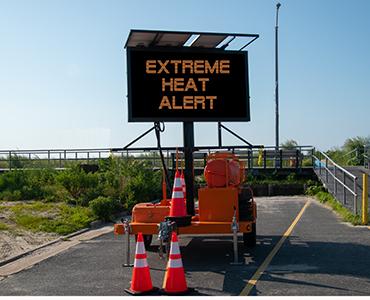The Working Groups are opportunities to drive interdisciplinary collaboration and make connections. If you wish to be added to EII’s mailing list and/or receive funding opportunities, notifications, email Xime Trujillo.
Extreme Heat Working Group

The University of Pennsylvania Extreme Heat Working Group is a scholarly community focused on studying and developing solutions to extreme heat events.
Extreme heat poses significant threats to ecosystems and human health. These effects are compounded when combined with high humidity, which hinders the body’s temperature regulation. Heat waves have increased in frequency and intensity in the 21st century due to human-induced greenhouse gas emissions, leading mortality and morbidity, as well as wildfires, crop failures, and infrastructure damage. In urban areas like Philadelphia, the “heat island effect” can render certain neighborhoods particularly vulnerable to the health impacts of heat. Extreme heat events are predicted to continue to rise with intensified climate change and ongoing urbanization. To tackle these challenges, the Extreme Heat Working Group is a collaborative effort of experts to enhance understanding and develop solutions to mitigate harmful effects on people, infrastructure, and ecosystems.
Goals
- Share ongoing research related to present and future impacts on humans and animals.
- Support the development of technology, policy, and societal solutions to mitigate detrimental effects of extreme heat.
- Collaborate with community partners to implement solutions in and around Philadelphia and beyond.
Resources
Link field url: #biodiversity
Biodiversity Working Group

The University of Pennsylvania Biodiversity Working Group is a scholarly community that leverages Penn’s academic expertise to develop transdisciplinary research, education, and outreach opportunities focused on solutions to halt and reverse biodiversity loss.
Biodiversity encompasses biological variability among, but also below and beyond, the level of species. Global awareness of the importance of biodiversity to the planet’s functioning and humanity’s well-being has never been greater. Yet understanding the factors that drive biodiversity loss is a complex challenge, as is designing and implementing effective conservation strategies. Conceptual frameworks like “ecosystem services” or “One Health” help reveal the interconnections between humans, animals, and the environment. But there is still much to learn about life’s variability and the tensions that emerge from efforts to restore it. For all these reasons, the Working Group gathers experts across campus to explore values, patterns, trends, and threats to biodiversity as we contemplate pathways toward a sustainable future.
Goals
- Foster interdisciplinary collaboration around environmental degradation and biodiversity loss.
- Develop public events, such as lectures and workshops, that highlight and advance discourse about knowledge, threats, and solutions to the biodiversity crisis.
- Promote and incentivize hands-on learning opportunities for students.
- Coordinate Penn’s observer status, responses to, and strategic participation in the meetings of the Convention on Biological Diversity (CBD) and other relevant multilateral convenings.